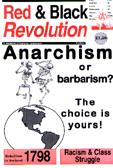Over 30 years of anarchist writing from Ireland listed under hundreds of topics
That's capitalism from WS61
It may come as a surprise, but the mystery around aeroplane crashes isn't what it used to be. In the mid- 1980s, research by the US navy on its fighter aircraft picked up on a problem with the electric wiring that was used, known as Kaptan. Kaptan was once thought to be safe but US Navy investigations discovered otherwise.
In certain circumstances - not uncommon in aircraft flying conditions - Kaptan can actually explode in a ball of fire. So what did the US Navy do?
WSM activity in mid 2000
The big event of the Autumn was in Prague when the fat cats of the World Bank gathered for a jamboree, and thousands of anti-capitalist protesters took to the streets. In Ireland the WSM helped organise the Carnival for Global Economic Justice which included events in Belfast, Cork, Derry, Dublin and Galway. The following week saw the WSM host public meetings in Belfast, Cork, Dublin (and at the Anarchist Bookfair in London) which were addressed by Vadim Barak of the Czech Organisation of Revolutionary Anarchists-Solidarita and Andrew Flood, a WSM member who took part in the protests.
The inflation con - demand pay increases
Isn't the Celtic Tiger great! This year's pay increase, under the Programme for Prosperity & Fairness, is 5.5%. As we go to press inflation is 6.2%, and rising. When the economy was in recession we were told to tighten our belts so that the economy could recover. Now that it is booming we are being told to accept what is actually a pay cut, in order to keep it booming.
Irish councils on the run over bin tax
Dún Laoghaire Rathdown
This Summer 60,000 or so householders in Dun Laoghaire Rathdown received instalment two of their bin bill. Inside in bright red ink it declared "It is intended to replace the traditional refuse collection method with a wheeled bin refuse collection to be introduced on a phased basis from September 2000. Wheeled bins will only be allocated to those householders who have a clear account"
Red and Black Revolution No. 4
Issue 4 of Red & Black Revolution
Contents Include:
Hobson's choice : The "Good Friday Agreement" and the Irish Left
Until the Real IRA blasted the heart out of Omagh and its people, the Northern "peace process" appeared to be close to achieving the impossible. Loyalists and Republicans alike signing up to the "Good Friday Agreement", its acceptance by large majorities on both sides of the border, Gerry Adams and Ian Paisley sitting down in the same room as part of the new Assembly - it seemed as if what had appeared for decades to be impossible had been overtaken by the realpolitik of the pragmatic. All sides in the "conflict" - we were led to believe - were looking to a new beginning. Countless column inches in the popular press had been written eulogising the "statesmanship" of David Trimble and Seamus Mallon, the "peacemaking skills" of Tony Blair and Bertie Ahern and the "pragmatism" of Gerry Adams and David Ervine.
Platformist groups in the year 2000
Anarchist organisations that have been influenced by the Platform are well aware that it is no Bible full of absolute truths. There is no grouping anywhere that would be so stupid to treat it as one. Anarchists have no need of such things. It is just one of the signposts pointing us in what we believe is the direction of making anarchism the most realistic and desirable alternative to both the present set-up and the authoritarian alternatives served up by most of the left.
The Platform: What's in it?
About the Organizational Platform of the General Union of Anarchists
Anarchists are constantly thinking about how society is and how it could be. We strive towards the ideal of a free and democratic society. We know that, in order to get there, it will be necessary to tear down the present authoritarian system of government. Our struggle for freedom throws up many areas of controversy and debate. One of these has always been, and always will be, how do we get to a revolution? How do we organise for change? An important contribution to this debate was the Organisational Platform of the Libertarian Communists*, a document which was written in 1926 by a group of exiled Russian and Ukrainian anarchists, and which still has much to offer to today's debates around the question of organisation.
Review: The Friends of Durruti Group: 1937-1939
The Friends of Durruti organisation, which arose from the ranks of anarchist militants during the Spanish Civil War, condemned the CNT and FAI members who joined the anti-Franco government. For their pains they were accused of wanting to establish an "anarchist dictatorship". Alan MacSimóin reviews the first English language book about them, and looks at the lessons to be learnt from Spain. The 'Friends of Durruti' appear in just about every book on the Spanish Civil War, especially in relation to the 1937 May Days in Barcelona. They get mentioned but we are told very little about their politics or activities. Some organisations, like the Workers Solidarity Movement, see their political stance as important to the tradition of revolutionary anarchism. Other anarchists, most notably sections of the syndicalist movement, condemn them for 'flirting with Bolshevism/Leninism/Trotskyism' or for 'advocating an anarchist dictatorship'. So who were they, where did they come from, what did they say, and what did they do?

